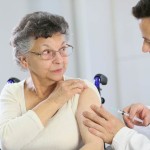Infectious mono: More than the ‘kissing disease’
Infectious mononucleosis, or mono, is often called the “kissing disease” because the virus can be easily transmitted by kissing.
While the most common way for the virus to spread is, indeed, through saliva, you don’t have to kiss someone with an active strain of it in order to contract it. It can also be transmitted by activities like sharing drinks and using another person’s utensils, or through blood and other bodily fluids.
Being exposed to mono does not guarantee an onset of symptoms, especially if you are exposed as a child. “Many people have the virus in their system throughout their lives without any symptoms,” says Rob Danoff, DO, an osteopathic family physician. “This is especially true in young children as fever (often persistent) may be the only symptom. We can only confirm if they were exposed and had the virus in them through a blood test.”
Many people have the Epstein-Barr virus in their system throughout their lives without any symptoms.
In fact, most people have been exposed to the virus by the time they reach middle age, with the majority acquiring the infection during childhood and severe symptoms more typical during the teen years. Mono is caused by the Epstein-Barr virus (EBV), which is a type of herpes virus and one of the most common human viruses. Other viruses in the herpes family cause cold sores and illnesses like chickenpox.
Epstein-Barr signs, symptoms
Sometimes the first indication that a person may have mono is a rash that develops after taking the antibiotics amoxicillin or ampicillin. These antibiotics are used for bacterial ailments and are frequently incorporated into treatment when a bacterial cause of a sore throat is suspected prior to a diagnosis.
Unusual fatigue is a very common early symptom of mono. “Often the person says ‘Doc, I am sleeping a lot but still tired and don’t feel like I am doing too much’,” Dr. Danoff says. Sometimes mono can be confused with the flu or strep throat because the symptoms are so similar, but with mono, the fatigue and other symptoms can go on for weeks or even months before an individual fully recovers.
Once a person is infected with the Epstein-Barr virus there is a lag time, or incubation period, during which the virus is multiplying in the body. This can last for several weeks and the patient can be asymptomatic the entire time though still able to spread the virus to others. People who get symptoms from EBV can expect them to last from two to four weeks, though some can feel fatigued for several weeks or months.
Once the virus is in your body, it remains there in an inactive state. If it reactivates, you can potentially spread it to others regardless of how much time has passed since the initial infection.
Symptoms of mono may include:
- Increased fatigue
- Unexplained fever (often between 101-104 degrees)
- Sore throat that may look like strep throat
- Enlarged liver or spleen (typically with pain or discomfort in the upper left side of the abdomen)
- Headaches
- Swollen lymph nodes, particularly on the sides of the neck, underarms or groin
- Swollen tonsils
- Decreased appetite
Treatment and prevention
There is no specific treatment for EBV other than relieving symptoms by staying hydrated, getting lots of rest and taking over-the-counter medications for pain and fever.
There is also no vaccine to protect against EBV infection, but there are ways to decrease your risk of mono, according to Dr. Danoff, who is program director of the Family Medicine Residency and the combined Family Medicine/Emergency Medicine Residency programs at Jefferson Health Northeast in Philadelphia. He believes in a preventive approach to medicine and encourages his patients to take charge of their health.
Ways to decrease the risk of mono:
- Don’t intimately kiss a person who is sick.
- Don’t share utensils, glasses, straws of a person who is sick.
- Don’t donate blood if you have mono.
- If you’ve been exposed to someone with Epstein-Barr virus, try not to touch your eyes, nose or mouth as the virus can live on moist surfaces for many hours.
- Keep your immune system strong through regular physical activity, a healthy diet and regular sleep (6-8 hours per night for adults; 8-10 hours for children).
Focusing on preventive care, Doctors of Osteopathic Medicine, or DOs, consider how environmental and lifestyle factors impact your health. They also partner with their patients to help them get healthy and stay well.

